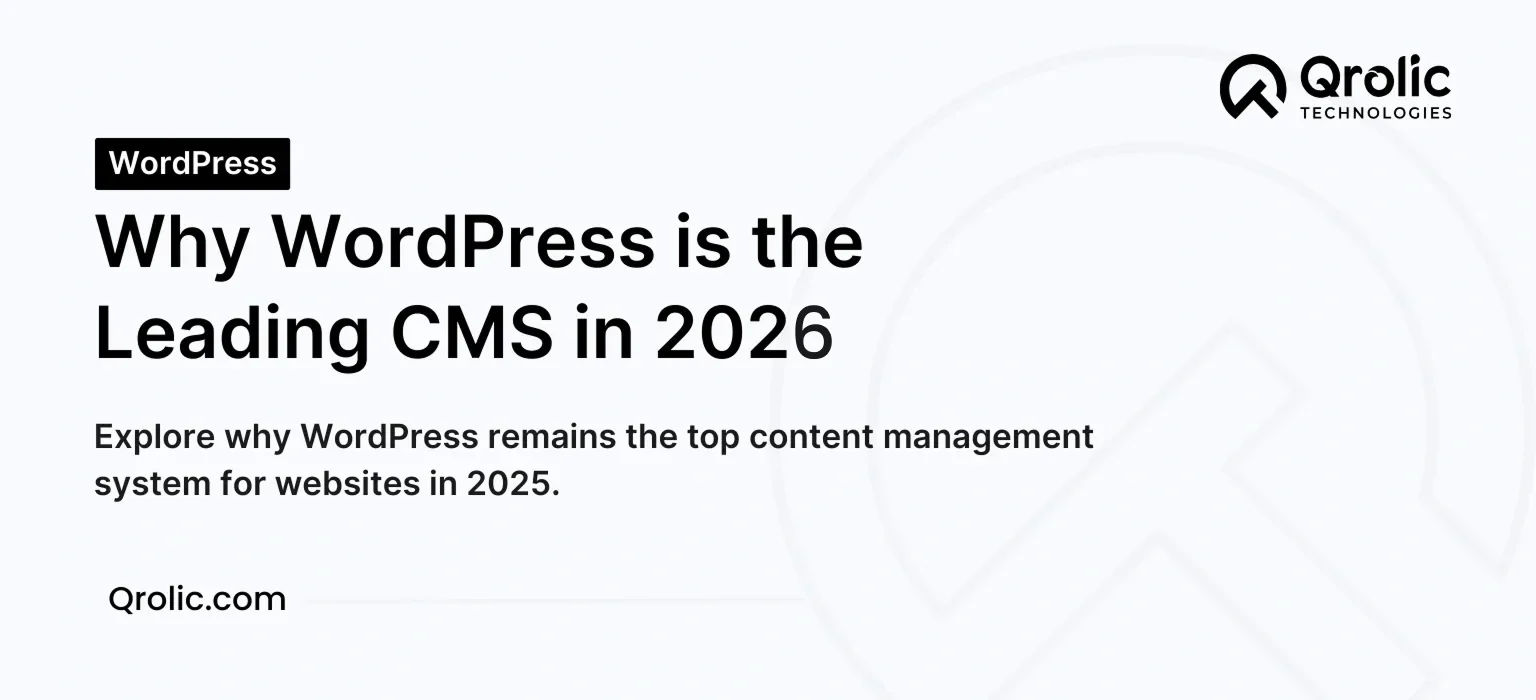In 2026, the digital world looks vastly different than it did even five years ago. We’ve seen the rise of spatial computing, the explosion of generative AI, and a shift toward “headless” web architectures. Yet, amidst this rapid technological turnover, one name continues to dominate the conversation: WordPress.
Far from being a legacy tool, WordPress has transformed itself into a cutting-edge operating system for the web. Powering over 43% of all websites globally and commanding a staggering 62% of the CMS market share, its leadership is not just a matter of history—it is a result of relentless evolution.
This guide explores why WordPress remains the undisputed champion of content management in 2026 and how you can leverage its power for your business.
Quick Summary:
- WordPress offers unmatched flexibility with vast themes and plugins.
- It’s user-friendly, scales for any size, and excels in SEO.
- A strong global community provides ongoing support and updates.
- Seamlessly integrates eCommerce, powering many online stores.
Table of Contents
- 1. The Power of “Phase 4” Gutenberg: Collaboration and Beyond
- Real-Time Collaboration
- Advanced Block Patterns & Synced Entities
- 2. The AI-First CMS: Intelligent Content & SEO
- Native AI Integration
- AI-Powered SEO Efficiency
- 3. Unmatched Scalability: From Blogs to Big Data
- Headless WordPress & REST API
- WooCommerce: The E-commerce Titan
- 4. The Global Community: A Security Fortress
- The “Immune System” of the Web
- Compliance by Default
- Elevating Your Strategy with Qrolic Technologies
- Why Qrolic is the Preferred Partner for WordPress Excellence
- 5. Cost-Effectiveness and “Future-Proofing”
- Ownership of Data
- Lower Long-Term TCO (Total Cost of Ownership)
- Summary: The WordPress Advantage in 2026
1. The Power of “Phase 4” Gutenberg: Collaboration and Beyond
By 2026, the Gutenberg project has moved into its final and most ambitious stages. What began as a simple block editor has become a full-scale site-building ecosystem that rivals high-end SaaS builders like Webflow or Squarespace, while maintaining the freedom of open source.
Real-Time Collaboration
The most significant leap in 2026 is the integration of multi-user collaboration directly into the WordPress core. Much like Google Docs, teams can now edit pages, write blog posts, and adjust layouts simultaneously. This feature has revolutionized how marketing agencies and large editorial teams operate, eliminating the “version control” headaches of the past.
Advanced Block Patterns & Synced Entities
WordPress has moved beyond individual blocks to “Synced Patterns.”
- Global Consistency: If you update a “Call to Action” pattern on one page, you can choose to have that change reflected instantly across your entire site.
- Smart Overrides: You can keep the layout of a section synced but allow for different text or images on specific pages, offering a perfect balance between brand control and flexibility.
2. The AI-First CMS: Intelligent Content & SEO
In 2026, WordPress isn’t just a place to store content; it’s an assistant that helps you create it. With deep AI integration, the platform has become a “Smart CMS.”
Native AI Integration
The WordPress core and major plugins (like Jetpack and Elementor AI) now offer:
- Generative Layouts: Describe your vision in plain English—“Build me a high-converting landing page for a vegan bakery with a hero section and a testimonial slider”—and the AI generates a block-based draft in seconds.
- Semantic Content Analysis: AI tools now analyze your writing for “contextual relevance” rather than just keyword density, helping you rank for the complex, intent-based queries that dominate 2026 search results.
AI-Powered SEO Efficiency
The marriage of AI and SEO within WordPress has made high rankings accessible to everyone. Tools like Rank Math and Yoast now use predictive analytics to tell you how a post is likely to perform before you even hit “Publish.”
Ready to Build Your Next Project?
Let’s turn your ideas into a powerful digital solution. Contact us today to get started with expert web development and design services.
3. Unmatched Scalability: From Blogs to Big Data
One of the biggest myths about WordPress is that it’s “just for blogs.” In 2026, some of the world’s most high-traffic enterprise sites run on WordPress, thanks to its modern architecture.
Headless WordPress & REST API
WordPress has embraced the “Headless” revolution. Developers can now use WordPress as a powerful backend to manage content while using ultra-fast frontend frameworks like Next.js or React to display it.
- Benefit: This allows for “app-like” speeds and superior security while keeping the user-friendly WordPress dashboard for content editors.
WooCommerce: The E-commerce Titan
WooCommerce now powers over 33% of all online stores. In 2026, its features include:
- AI Product Descriptions: Automatically generated based on product images.
- Blockchain Integration: Native support for secure, decentralized payment gateways and NFT-based loyalty programs.
4. The Global Community: A Security Fortress
The strength of WordPress has always been its people. With millions of eyes on the code, vulnerabilities are identified and patched faster than in any closed-source system.
The “Immune System” of the Web
In 2026, the WordPress security team uses machine learning to identify patterns in brute-force attacks across the global network. When an attack is detected on a site in London, the “digital antibodies” are shared, and sites in New York or Mumbai are protected before the threat even reaches them.
Compliance by Default
With stricter data privacy laws (GDPR 2.0 and the Cyber Resilience Act) active in 2026, WordPress has built advanced privacy and data-portability tools directly into the core, ensuring business owners stay compliant without needing a law degree.
Ready to Build Your Next Project?
Let’s turn your ideas into a powerful digital solution. Contact us today to get started with expert web development and design services.
Elevating Your Strategy with Qrolic Technologies
While WordPress provides the tools, achieving “Masterpiece” status requires a skilled architect. This is where Qrolic Technologies steps in.
Why Qrolic is the Preferred Partner for WordPress Excellence
Qrolic Technologies is a leading WordPress agency that specializes in transforming standard installations into high-performance business engines.
- Expert Block Theme Development: They are pioneers in Gutenberg-first development, creating custom block themes that are W3C-validated, lightning-fast, and fully optimized for the 2026 web.
- Complex Custom Plugins: Need a feature that doesn’t exist? Qrolic’s developers build bespoke plugins tailored to your specific workflow, ensuring your site remains lean and powerful.
- Performance & Speed Optimization: In a world where every millisecond counts, Qrolic Technologies uses advanced database optimization and server-side tuning to ensure your site passes Google’s Core Web Vitals with flying colors.
- Enterprise-Grade Maintenance: From proactive security scans to seamless core updates, their maintenance plans (starting at just $97/month) ensure your digital asset is always protected and performing at its peak.
Whether you are looking for a complete redesign or a technical partner to manage a high-traffic ecosystem, Qrolic Technologies has the expertise to turn your WordPress dreams into a scalable reality.
5. Cost-Effectiveness and “Future-Proofing”
In an era of rising subscription costs (SaaS “tax”), the open-source nature of WordPress is more attractive than ever.
Ownership of Data
Unlike “walled garden” platforms, you own your WordPress Site entirely. You can move your hosting, export your data, and change your design at any time. In 2026, Data Sovereignty is a major priority for businesses, and WordPress is the ultimate tool for maintaining it.
Lower Long-Term TCO (Total Cost of Ownership)
While custom development has an upfront cost, the lack of high monthly platform fees and the abundance of free, high-quality resources make WordPress the most financially sound choice for the long term.
| Feature | WordPress (2026) | Typical SaaS Builder |
| Data Ownership | 100% | Limited |
| Customization | Infinite (Open Code) | Restricted to API/Templates |
| SEO Flexibility | Advanced / Full Control | Basic / Hard-coded |
| Scalability | Enterprise-Ready | Often requires expensive “Pro” tiers |
Summary: The WordPress Advantage in 2026
WordPress has survived and thrived for over two decades because it refuses to stand still. In 2026, it is the leading CMS because it offers:
- Ease of Use for beginners through visual block editing.
- Unrivaled Power for developers through Headless and API-first capabilities.
- Future-Ready Features like AI content assistance and real-time collaboration.
- A Global Support Network that ensures you are never stuck with a problem for long.
Whether you are a solo entrepreneur or a Fortune 500 company, WordPress provides the most flexible, secure, and scalable foundation for your digital future.









